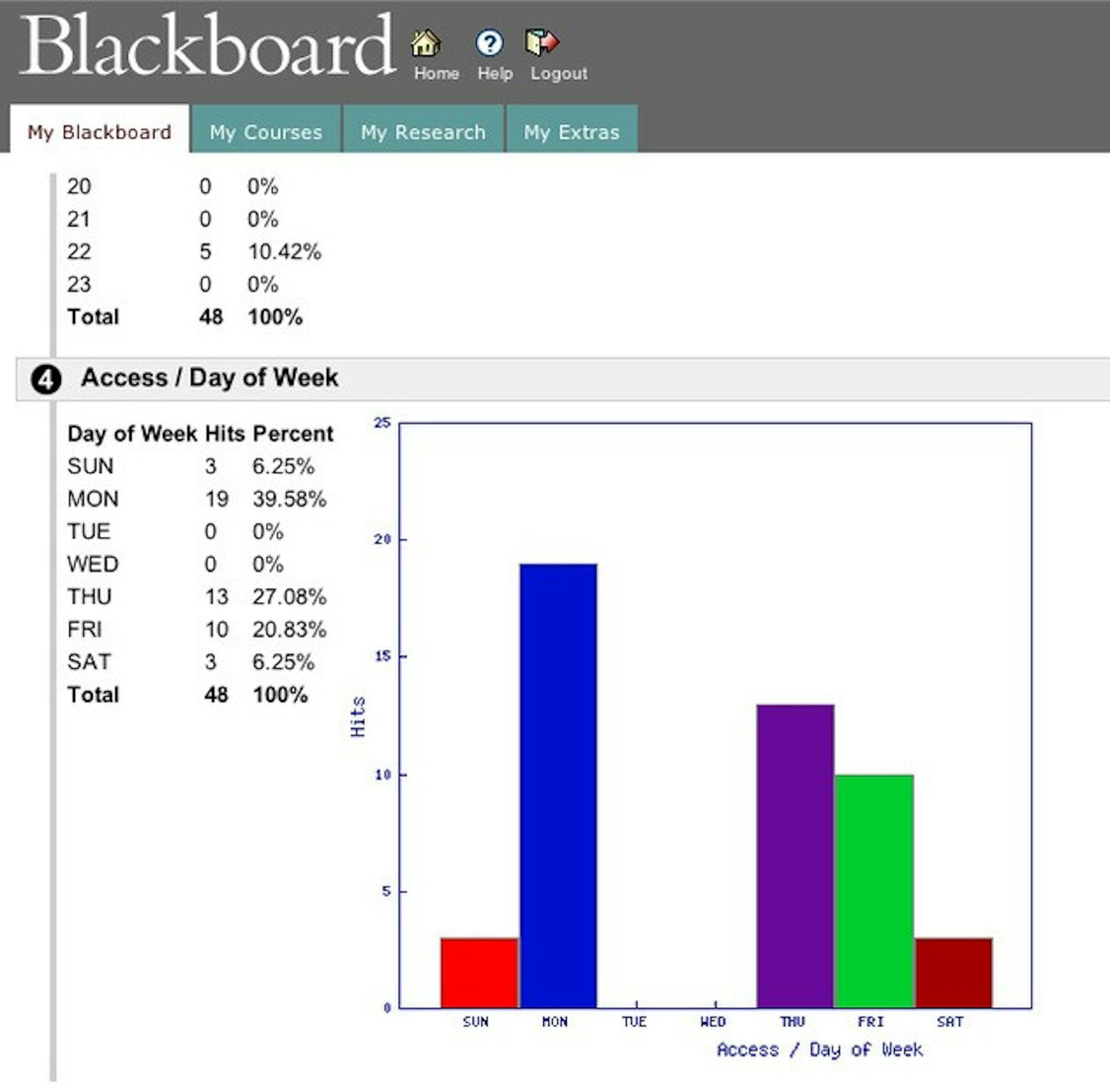Curious professors are given the option to pinpoint exactly when any given student last logged on to the course Web site.
"They basically see a time and date stamp," Barbara Knauff, a member of the curricular computing staff, said.
Knauff explained that a professor cannot see how many times a student has accessed the course Web site or how long the student spent browsing the site. Only the time of last access is recorded. Students must have clicked on the specific course link to be recorded; users logged into Blackboard in general are not tracked. The professor also has the option to look at aggregate data that reflects the general trends of access among all users and is not broken down by student.
This feature was introduced when the Blackboard software was upgraded to Version 7 over the summer.
Instructors may also use a feature carried over from previous versions of the software to track the number and identity of students who have downloaded files posted in any section of the course Web site.
"That feature does need to be turned on specifically," Malcolm Brown, director of academic computing, explained.
It is not enabled by default and must be selected for each document that a professor wishes to track, potentially allowing some documents to be tracked while others are not.
Though many professors interviewed were either unaware of these features or chose not to use them, those who did implement tracking found it to be a useful tool.
"It helps me get a good sense of which materials students are using," English professor Jonna Mackin said.
Mackin said that she is now more inclined to post supplementary readings for her classes because the data from Blackboard indicated that the majority of students were accessing them.
She also said that she tends to look more at general statistics than tracking individual users.
"It's a lot of information and it wouldn't be worth it to always look at it all," Mackin said, but admitted that if she had a student who was performing poorly in the class, she would be more likely to look at that student's individual statistics.
Mackin said that she always makes a point to inform her students at the beginning of the term that she will be using the tracking features.
"It occurred to me that this is not something that would occur to a student, that I could do this," she said.
Mackin stated that when she began using the feature, she asked the Blackboard staff if she was required to inform the students that she was tracking usage, but was told that such a decision was left to the discretion of the professor.
Students who have learned about the tracking features, however, are calling for more public and more widespread notification. David Nachman '09, vice president of the Student Affairs Committee, said that he discovered the existence of the tracking features by reading about student controversy over the issue in the Brown Daily Herald. He was concerned that many students did not know that they were being tracked and also that such actions could violate Dartmouth's computing privacy policy.
"I feel that students should at least be warned," Nachman said. "I don't know if this literally violates the policy, but I do think that it violates the spirit of the policy."
The policy states that "Members of the Dartmouth community have reasonable expectations of privacy in their use of information resources," and that "Some programs and networked services gather information about the people who use them. If such information could directly or indirectly identify a person using the program, then each user should be warned and given a chance to leave the program or service before data collection begins, a procedure referred to as a 'privacy warning.'"
The computing policy does state that in certain situations, some programs are exempted from giving a privacy warning and provides a list of these programs and the information that they record in the appendix. Though Blackboard is mentioned in the appendix, it is only to inform users that Blackboard systems administrators may log on to students accounts when students ask for technical support. Neither the appendix nor the Blackboard software itself informs users that their actions may be tracked.
Brown was also not sure if Blackboard tracking contradicted the privacy policy.
"It's not clear to me whether there's a violation or not. We need to do work with faculty and students to clear things up," Brown said.
He added that he plans to meet with Nachman to discuss further action, including the possibility of adding a prominent disclaimer to students in several locations. Student Assembly is also planning to form a committee to further investigate the issue.




